15 Hotel Red Flags Staff Notice Instantly + 3 Pro Tips For A Smarter Stay
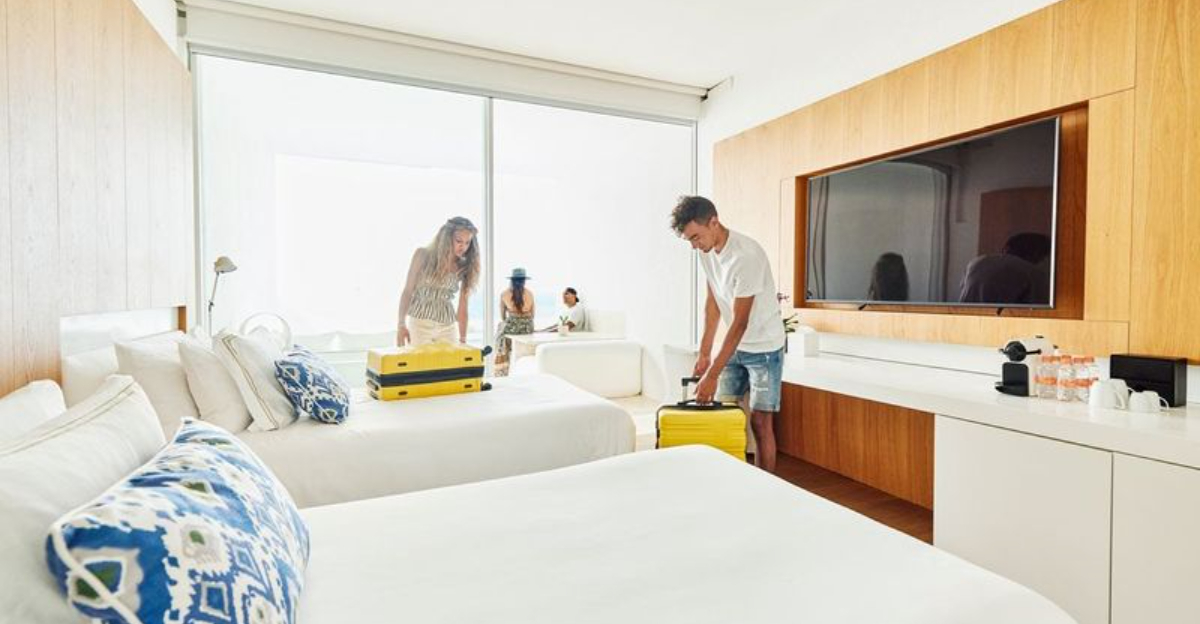
Ever walk into a hotel and feel like the front desk staff instantly sized you up? Well, they kind of did—and not necessarily in a bad way. After years working behind that counter, I’ve picked up on the subtle cues that tell us whether a guest is going to be easygoing… or the one we’ll all talk about during break. The truth?
Many guests shoot themselves in the foot right from check-in with a handful of habits that scream “problem ahead.” Whether it’s snapping fingers, demanding upgrades before saying hello, or treating staff like servants, these red flags set the tone for the entire stay.
Curious what not to do if you want better service, possible perks, or just a smooth, enjoyable experience? I’m spilling the insider secrets so you can stay on the good side of hotel staff—and maybe even score a little VIP treatment.
1. Asking for Room Upgrades Loudly
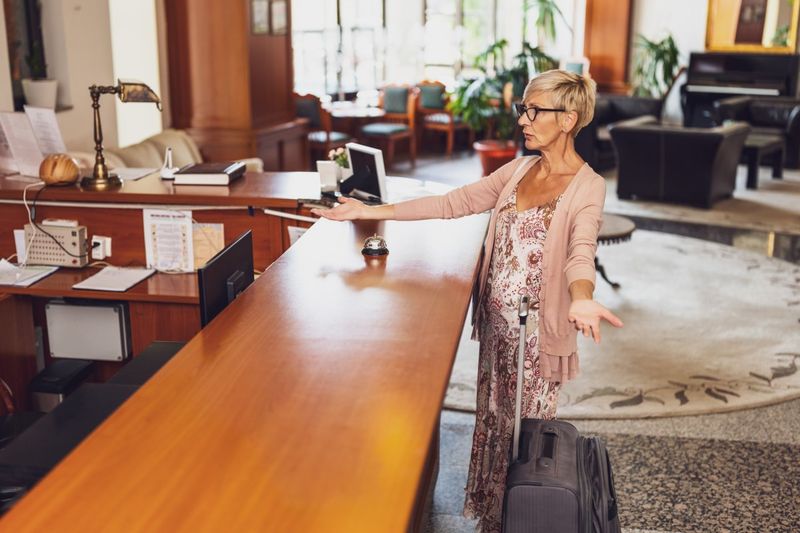
Hotel staff cringe when guests demand upgrades at top volume. This tactic doesn’t impress anyone – it just broadcasts that you’re trying to get something for nothing while making others uncomfortable.
Front desk agents actually have upgrade discretion, but they’re less likely to use it for guests creating scenes. Instead of announcing “I ALWAYS get upgraded at other hotels!” try a quiet, friendly inquiry about available options.
Most importantly, timing matters. Arriving during peak check-in while loudly insisting on an upgrade puts you on the staff’s mental do-not-upgrade list faster than anything else.
2. Ignoring House Rules
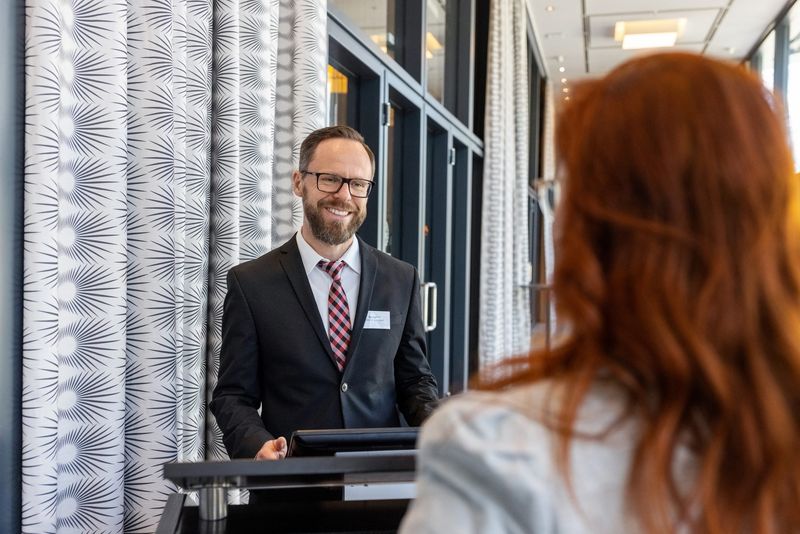
When guests dismiss posted policies about pool hours, noise levels, or pet restrictions, staff immediately recognize trouble brewing. These rules exist for everyone’s comfort and safety, not as mere suggestions.
The guest who argues “just this once” about sneaking their dog into a no-pet property or insists pool hours don’t apply to them signals they’ll likely cause problems throughout their stay. Staff communicate these infractions to each other across departments.
If you genuinely need an exception to a policy, ask politely before your stay rather than bulldozing through rules after arrival. Flexibility exists, but respect must come first.
3. Leaving Valuables Unattended
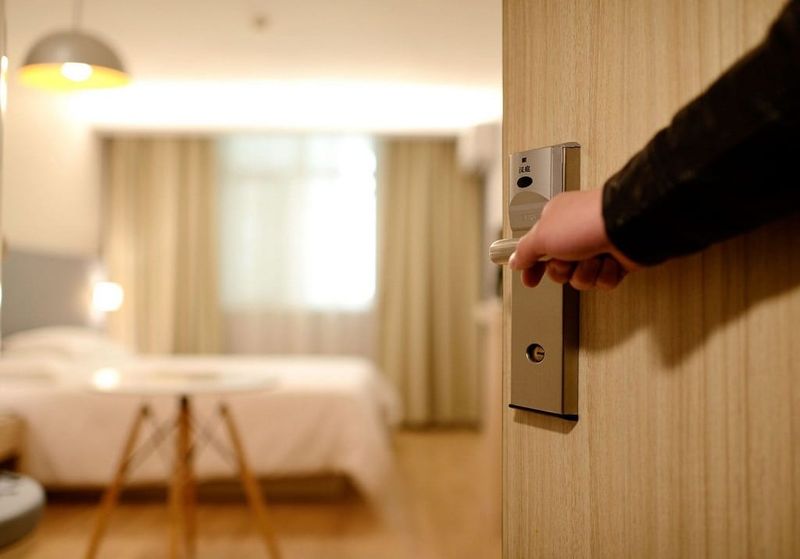
Spotting laptops, jewelry, or wallets left in plain view makes hotel staff nervous – not because they’re tempted, but because they know the risks. Housekeeping often declines to clean rooms with exposed valuables to avoid potential blame.
Staff notice when you abandon belongings in lobbies or by pools while “just running to grab something.” These moments create security concerns and liability issues for the property.
Use your room safe consistently, even for short absences. When staff see guests casually disregarding security, they mentally flag the room as potentially problematic – especially if you later claim something’s missing.
4. Being Rude at Check-In

Your first interaction sets the tone for your entire stay. Arriving with attitude, refusing to make eye contact, or talking on your phone while staff attempt to help you immediately marks you as a difficult guest.
Front desk agents control more than just room assignments – they influence whether maintenance responds quickly to your requests or if the kitchen expedites your room service. A dismissive “just give me my key” approach can subtly affect service throughout your stay.
The staff member checking you in typically notes guest behavior in the system. This information follows you not just during this visit but potentially for future stays too.
5. Hanging “Do Not Disturb” All Week
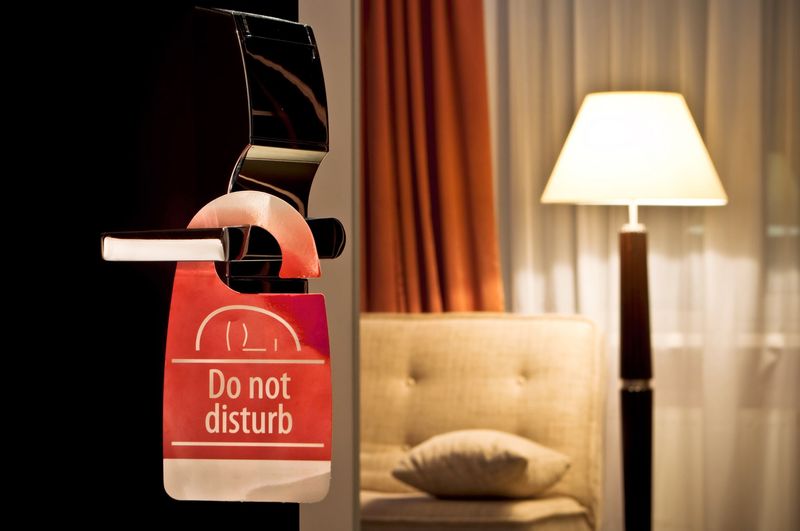
Keeping that DND sign on your door for days raises immediate red flags for hotel staff. While privacy is respected, extended periods without room access trigger security protocols at most properties.
After 2-3 days, management will likely contact you or even enter despite the sign. This isn’t about invading privacy – it’s about ensuring guest safety and preventing property damage like water leaks or other hazards.
If you genuinely prefer limited housekeeping, simply tell the front desk your preferences at check-in. Most hotels offer options like towel-only service or every-other-day cleaning that maintain both privacy and security standards.
6. Flirting with Staff

Inappropriate advances toward hotel employees make staff extremely uncomfortable. That “friendly” comment about a staff member’s appearance or insistence they join you for a drink after their shift isn’t charming – it’s harassment.
Hotel workers are trained to remain pleasant even when uncomfortable. Their polite smiles don’t indicate interest, just professional courtesy while they’re essentially trapped in conversation with you.
Staff communicate about guests who cross boundaries, and your room number gets flagged. Female staff might be reassigned away from your room, male security might handle your requests instead, and management watches interactions closely – all while you remain oblivious to the behind-the-scenes concerns you’ve created.
7. Overusing the Front Desk
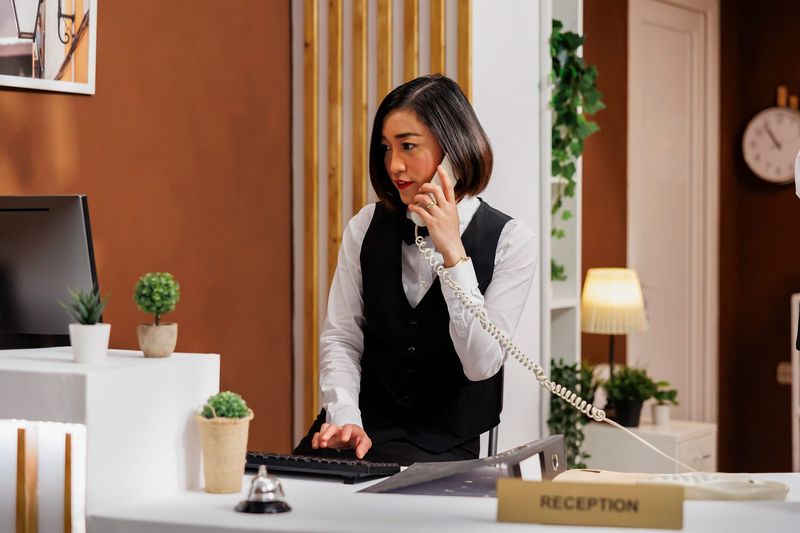
Repeatedly calling or visiting reception for minor issues signals to staff that you’ll be high-maintenance throughout your stay. The guest who phones five separate times asking about ice machines, TV channels, and whether the gift shop carries aspirin becomes instantly recognizable by voice alone.
Modern hotels offer information through multiple channels – room directories, hotel apps, and in-room tablets. Staff notice when guests ignore these resources and instead demand constant personal attention for easily-answered questions.
If you genuinely need assistance, consolidate your questions into one interaction when possible. This approach actually results in more thorough help rather than staff trying to quickly address each separate inquiry to reduce call frequency.
8. Not Checking Room Immediately
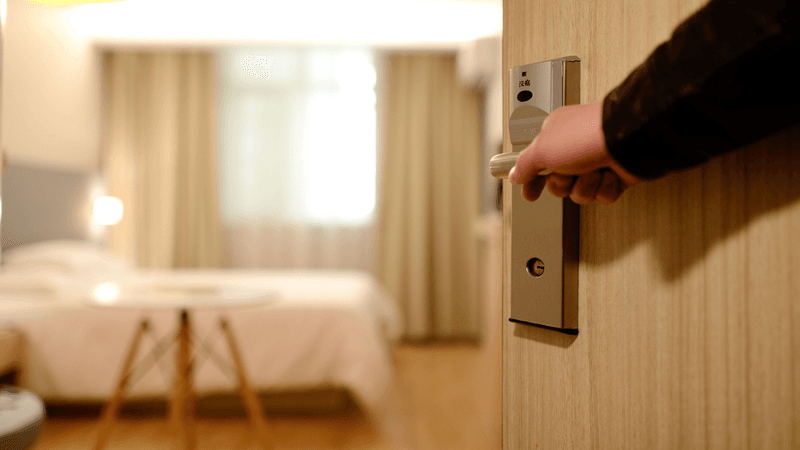
Smart travelers inspect their rooms within the first 15 minutes after check-in. Staff know that guests who fail to report issues promptly often become the most vocal complainers later.
Quick room checks signal to management that you’re reasonable and attentive. Test the shower, check for cleanliness issues, and ensure everything functions properly while it’s still easy to move you to another room.
Waiting until midnight to report that your TV doesn’t work or complaining about a maintenance issue on day three raises suspicions about whether the problem existed at check-in or happened during your stay. Hotels track these patterns and note when guests consistently report problems too late for easy resolution.
9. Requesting Unusual Discounts

Staff immediately notice when guests attempt creative discount schemes. Claims like “I’m an influencer” or “I know the owner” are surprisingly common and rarely successful.
Hotels have established discount programs – corporate rates, loyalty memberships, AAA benefits – with verification processes. Inventing connections or making vague references to someone who “always gives me a special rate” signals you’re not being straightforward.
Legitimate discounts exist for many situations, but the approach matters. Ask directly about available rates for your actual circumstances. Staff appreciate honesty and often have flexibility for genuine situations, but invented scenarios or pressure tactics immediately mark you as problematic.
10. Complaining Without Specifics
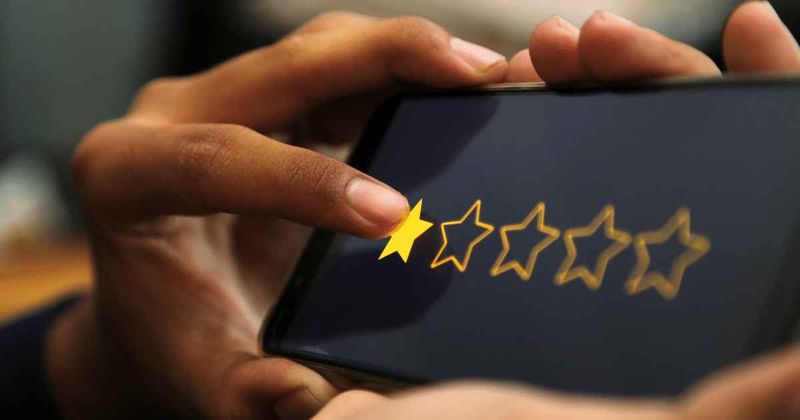
Vague grievances like “this room isn’t what I expected” frustrate hotel staff who genuinely want to fix problems. Without specific details, they can’t offer meaningful solutions or determine if the issue warrants compensation.
Effective complaints include precise information: “The shower temperature fluctuates between scalding and freezing” rather than “the bathroom isn’t good.” Staff notice when guests provide clear, factual reports versus emotional, detail-free complaints.
Hotels track complaint patterns by room and by guest. Those who consistently offer vague dissatisfaction often receive minimal compensation compared to guests who clearly articulate specific, fixable issues. The difference isn’t personal – it’s about actionable information.
11. Leaving a Mess Daily
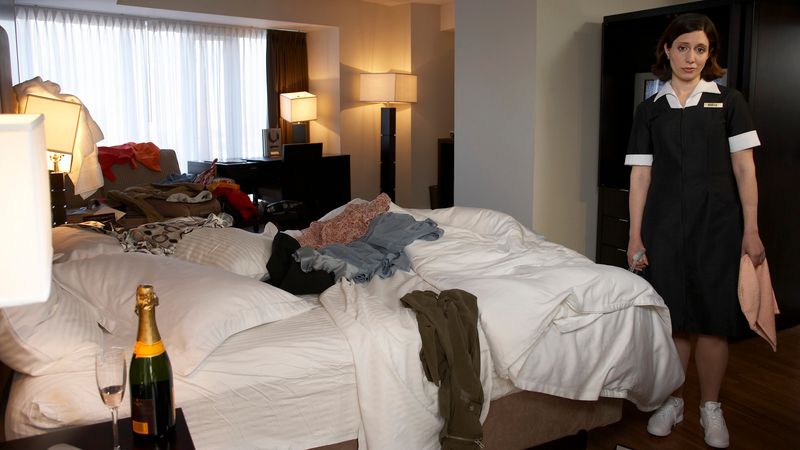
Housekeepers talk, and rooms that consistently require extra cleaning time get flagged. While nobody expects hotel-perfect tidiness, there’s a difference between normal living and deliberate disregard for basic cleanliness.
Staff immediately notice rooms with food smeared on furniture, excessive trash scattered everywhere, or towels used for cleaning spills rather than calling for assistance. These behaviors signal disrespect for both the property and the people who maintain it.
The myth that “it’s their job to clean up” misunderstands hotel housekeeping. Their role includes changing linens and sanitizing surfaces – not managing hazardous conditions or spending triple the allotted time on a single room because of preventable messes.
12. Smoking in Non-Smoking Rooms
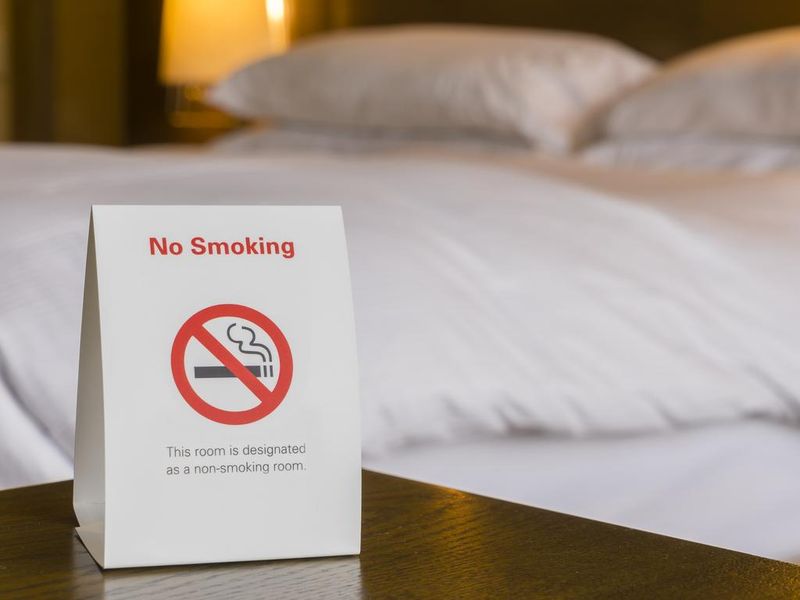
Trying to hide in-room smoking fools absolutely no one. Opening windows, running shower steam, or spraying perfume doesn’t eliminate the evidence – especially since modern hotels have sensitive smoke detectors and air quality monitors.
This violation typically results in automatic cleaning fees ranging from $250-500, and staff can detect cigarette, marijuana, and vape residue equally well. The cleaning required goes far beyond normal housekeeping, often necessitating special equipment and taking rooms out of inventory.
Hotels maintain records of smoking violations, and repeat offenders may be placed on do-not-rent lists. If you smoke, request smoking-friendly accommodations when available or plan for designated outdoor smoking areas rather than risking substantial fees.
13. Arguing About Late Checkout
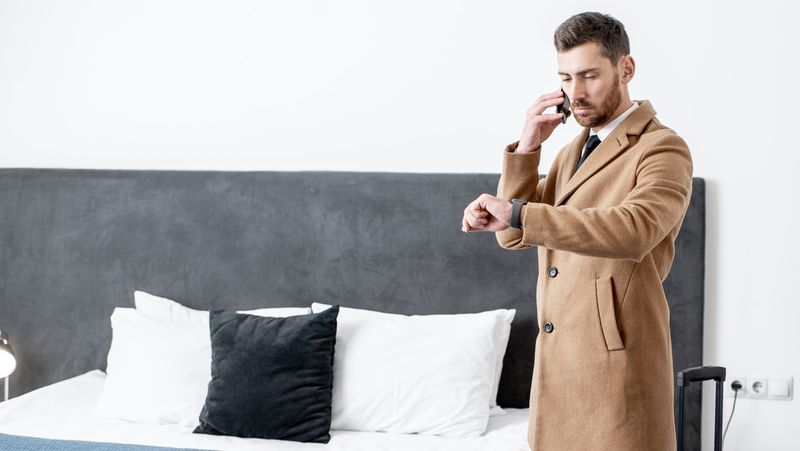
When checkout time arrives and you’re still lingering, staff immediately recognize a potential conflict brewing. Hotels operate on tight room turnover schedules, with housekeeping assignments planned precisely.
Extending your stay by even 30 minutes without prior approval disrupts an entire system. Late checkouts affect not just your room but the entire housekeeping schedule, potentially delaying check-in for incoming guests across multiple rooms.
Most properties gladly accommodate late checkout requests made in advance. The red flag isn’t needing extra time – it’s ignoring checkout policies, then arguing when reminded. This behavior signals a guest who prioritizes personal convenience over the hotel’s operations and other travelers’ experiences.
14. Tampering with Mini Bar
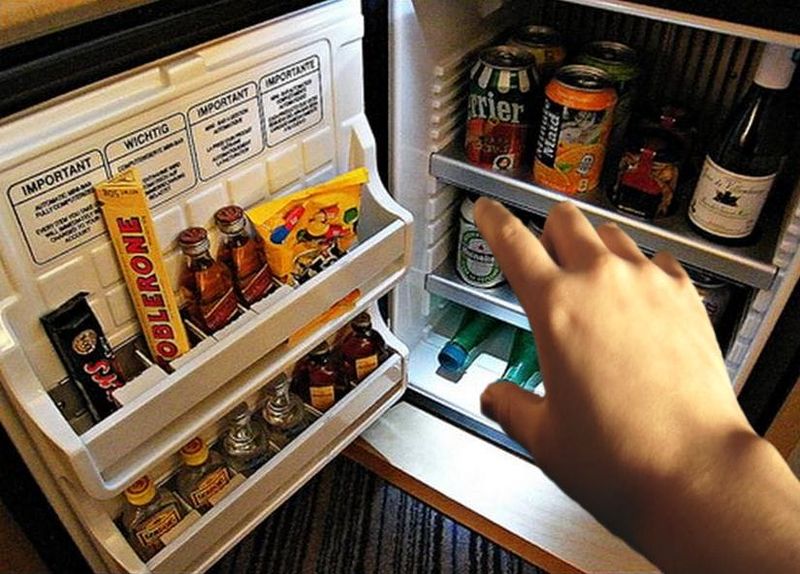
The mini-bar hustle isn’t nearly as clever as some guests think. Drinking alcohol then refilling bottles with water or replacing items after consuming them isn’t outsmarting anyone – it’s theft that hotels track systematically.
Modern mini-bars often include weight sensors that detect when items are removed, regardless of what’s put back. Even without technology, staff are trained to spot tampered products through subtle signs like broken seals or misaligned labels.
This behavior immediately flags your room for extra scrutiny. Beyond the charges you’ll likely still receive, hotels often note this behavior in guest profiles. The small amount saved isn’t worth the potential for being identified as problematic in hotel systems across entire chains.
15. Sneaking in Extra Guests
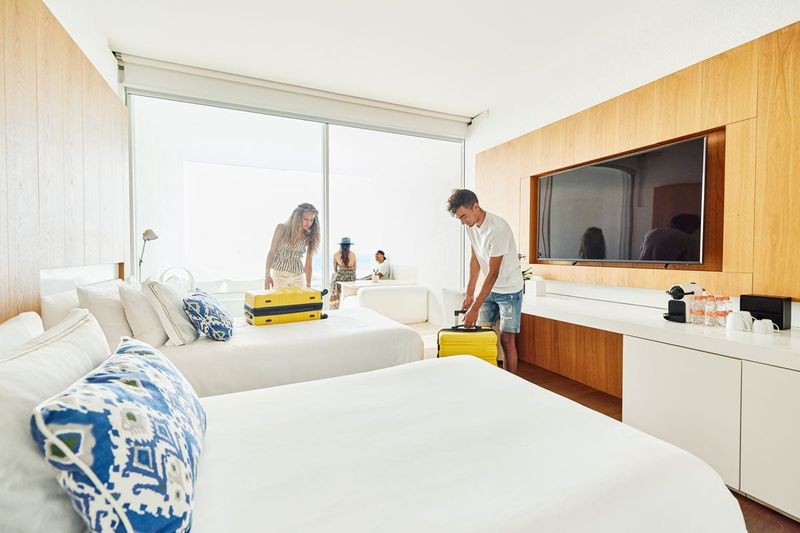
Hotels charge per person for legitimate reasons – additional guests increase water usage, require extra amenities, and impact breakfast service or pool capacity. Staff immediately notice when two registered guests suddenly become five.
Security cameras, breakfast attendants, and housekeepers all observe actual guest counts. Those “discreet” extra visitors using pool facilities or grabbing breakfast aren’t going unnoticed – they’re being documented.
Rather than risk additional charges added to your folio or potential eviction for policy violations, simply be upfront about your party size. Many hotels have reasonable additional person fees, and honesty prevents the awkward conversation when staff inevitably confront you about the discrepancy between registered and actual guests.
16. Use Mobile Check-In (Pro Tip)
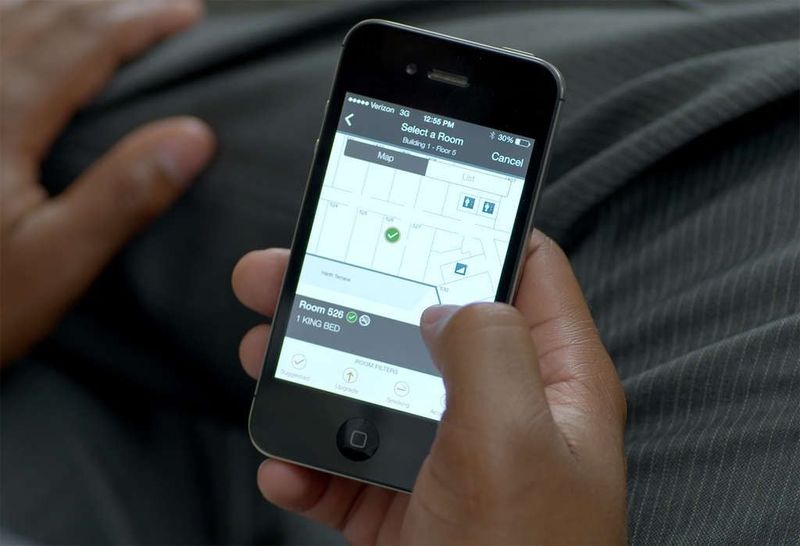
Mobile check-in isn’t just convenient – it’s strategic. Savvy travelers know this system often gives you first access to available room upgrades before they’re visible to front desk agents.
Many hotel apps allow room selection similar to airplane seat assignments. Checking in digitally 24-48 hours before arrival lets you browse available rooms and potentially select premium locations that might otherwise be assigned randomly.
This approach also creates a digital record of your preferences and any special requests. When you do interact with staff, they’ll already have your information processed, allowing them to focus on personalizing your stay rather than data entry. For loyalty program members, mobile check-in often triggers upgrade considerations earlier in the system.
17. Ask for Corner Rooms (Pro Tip)
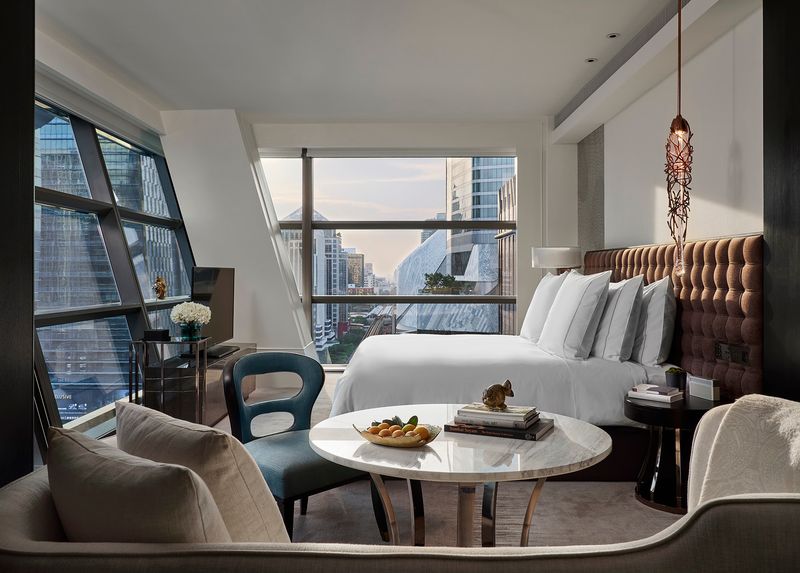
Corner rooms offer significant advantages rarely advertised by hotels. These coveted spaces typically feature more windows, additional square footage, and fewer shared walls with other guests – all usually at the standard room rate.
Hotel insiders know corner rooms often have unique layouts that feel more spacious even within the same room category. The extra buffer from neighboring guests provides noticeably improved noise reduction, especially in urban properties.
When requesting a corner room, timing matters. These rooms are limited by building design, so ask during booking rather than at check-in. For best results, phrase it as a preference rather than a demand: “If available, I’d really appreciate a corner room for the extra quiet.”
18. Tip Housekeeping Early (Pro Tip)
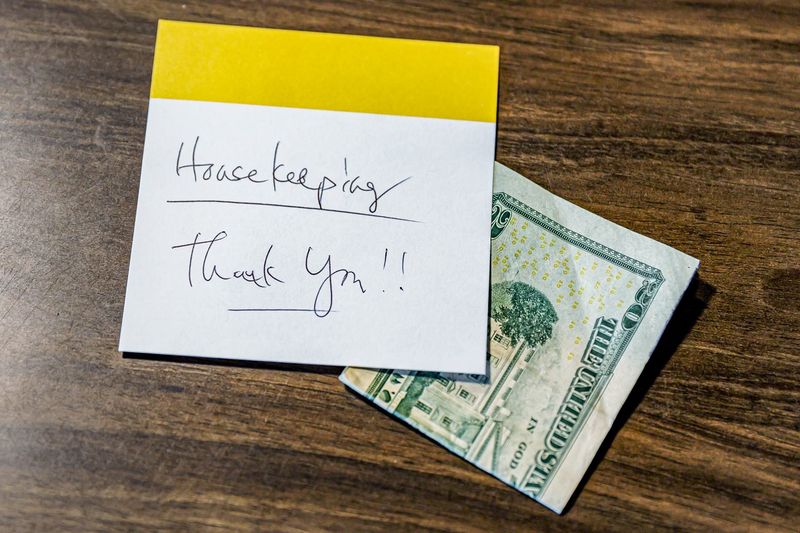
Leaving a few dollars for housekeeping isn’t just courteous – it’s strategic when done on your first day. This simple gesture establishes goodwill with the staff who most directly impact your room experience.
Housekeepers often service the same rooms throughout your stay. An early tip with a quick note (“Thanks for your help this week!”) frequently results in extra attention to detail, from perfect pillow arrangements to additional toiletries or towels.
The most effective approach is leaving $2-5 per day clearly marked as a tip on the pillow or desk, rather than loose change that might appear forgotten. This small investment often yields noticeable improvements in service that far exceed the modest cost.
